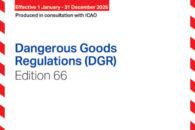 As a bridge between the developers and the users of Dangerous Goods regulations, Labelmaster strives to understand the needs of both the regulated industries and the regulators. This way, we can provide the optimum solutions for our customers.
As a bridge between the developers and the users of Dangerous Goods regulations, Labelmaster strives to understand the needs of both the regulated industries and the regulators. This way, we can provide the optimum solutions for our customers.
And, since we closely follow the discussions and decisions of both industry and regulators, it will come as no surprise to regular readers of this blog to hear that my colleague Pia Jala and I were guests at the recent IATA Dangerous Goods Board (DGB) meeting in Miami.
Equally unsurprising? The major discussion points for the airlines involved lithium batteries!
The “hot” topic
If exploding hoverboards and state-of-the-art cell phones weren’t enough to focus the public’s attention on portable electronic devices (PEDs) and the lithium batteries that make them dangerous, the U.S. and UK’s selective ban on passengers carrying them in airplane cabins should have completed the hat trick!
So, yes, PEDs were a “hot” topic at the recent IATA DGB meeting in Miami—along with mobility aids such as wheelchairs and all the new and ever-increasing uses to which lithium batteries are put.
And what was decided? Sorry, but I can’t be specific on what happened at the IATA meeting—it’s private, and the report isn’t out yet. But I will say there was one key decision made that perhaps I can discuss in the near future.
Airlines’ incredible dedication to safety
The DBG is a semi-annual meeting where IATA member airlines get together to review safety trends and issues and take any steps necessary to ensure passengers and crew fly as safely as possible around the world. Those steps can take many forms, from operational changes in the way Dangerous Goods are accepted to recommendations for governments to adopt through the ICAO Dangerous Goods Panel (DGP).
For more than 60 years, the airlines, through their IATA trade association and the governments’ regulation arm at the ICAO DGP, have closely monitored and controlled Dangerous Goods transported on aircraft. The level of safety delivered by literally generations of dedicated professionals is incredible. Yet, as one or two sad events have taught us, vigilance and a proactive edge are the keys to safe air travel and transport.
At the DGB meeting, we learned that IATA is maintaining that edge by developing increasingly sophisticated means of tracking Dangerous Goods on aircraft through electronic checklists, documentation and incident recording.
Of course, it’s 2017, and North American observers might wonder why these have taken so long.
The clout of government
Quite simply, the world is a complex place. Developing global solutions for Dangerous Goods transport requires coordination across dozens of technologies, languages and regulatory schemes.
The key solutions, however, need the clout of government to ensure they’re right for all the industries in the logistical chain—manufacturers, shippers, freight forwarders, ground-handling agents, airlines and final customers (a.k.a. consignees). And don’t forget those same entities as they flow in the opposite direction—the so-called “reverse logistics” process.
Therefore, much of the IATA DGB’s Miami work will be shared with the ICAO DGP at its meeting in Montreal next week. On that occasion, I’ll be there in an official observer capacity, wearing my Dangerous Goods Advisory Council hat to provide the perspective and input of the shippers Labelmaster serves.
If you’re brave, you can read the topics to be presented and proposals to be made at next week’s ICAO Working Group meeting (DGP-WP/17). The information is publicly available here. Reading them is not for the faint of heart, but they are incredibly important. I will provide a summary of the key issues in a later post.
Labelmaster is a full-service provider of goods and services for the hazardous materials and Dangerous Goods professional, shippers, transport operators and EH&S providers. See our full line of solutions at labelmaster.com.



